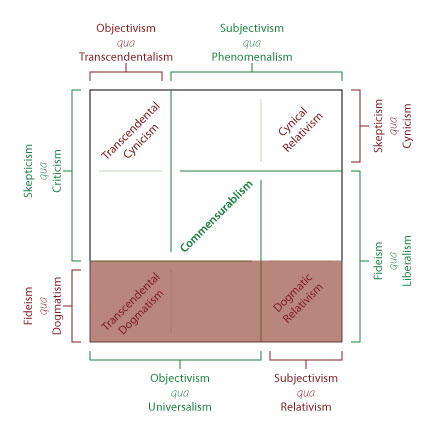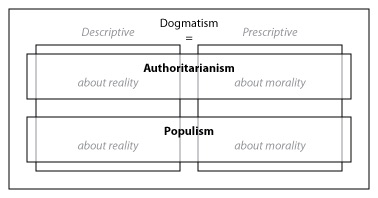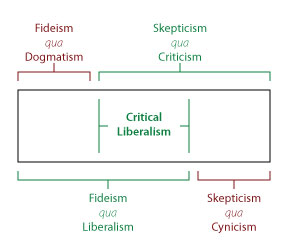Against Dogmatism

In my earlier essay on Commensurablism, I laid out my four core principles and their negations:
- the principle of universalism, a kind of objectivism, versus its negation, a kind of subjectivism called relativism; but also
- the principle of phenomenalism, a kind of subjectivism, versus its negation, a kind of objectivism called transcendentalism; and
- the principle of liberalism, a kind of fideism, versus its negation, a kind of skepticism called cynicism; but also
- the principle of criticism, a kind of skepticism, versus its negation, a kind of fideism called dogmatism.
In this essay I will first recap why I am against dogmatism, then elaborate more on what exactly is or isn't included in that category.
I reject dogmatism on pragmatic grounds, as explained previously in my essay on commensurablism:
- The task of philosophy is to find a way of discerning correct answers from incorrect answers to questions of any kind, whether about what is real or true or existent, or about what is moral or good or valuable.
- The position that there is always a question as to which opinion, and whether or to what extent any opinion, is correct, is to be called "criticism", and its negation "dogmatism".
- If we assume dogmatism rather than criticism, then in case our opinions do happen to be incorrect after all, we will never find out, because we never question them, and we will remain incorrect forever.
- Therefore to successfully do philosophy at all we must at least tacitly assume criticism, rejecting dogmatism.
It is fine and even unavoidable that we pick our initial opinions arbitrarily, for no good reason. But when we do, we then have a very high chance of those initial opinions just happening to be incorrect. If we go on to hold those arbitrary opinions (that we just happened into for no solid reason) to be above question, which is the defining characteristic of dogmatism as I mean it here, then we will never change away from those incorrect opinions, and will remain incorrect forever.
Only by rejecting dogmatism, and remaining always open to the possibility that there may be reasons to reject our current opinions, do we open up the possibility of our opinions becoming more correct over time. So if we ever want to have more than an arbitrary chance of our opinions being correct, we must always acknowledge that there is a chance that our opinions are incorrect.
The mere fact that someone holds an opinion, or that some opinion seems like the correct one to them, doesn't constitute a good reason for anyone else to adopt that opinion, or for anyone to discount the alternatives. Everyone's own assertions should be open to question, not only by other people, but by themselves; we should all question whether and why we should accept what we ourselves think is correct. That is, we must remain open to the possibility that those opinions that we hold without full justification might someday be shown incorrect, and that if we are presented with reasons to reject them, then we must do so.
Dogma is the Greek word for "tenet", as in something held to be firmly established or accepted, so by dogmatism I mean ever uncritically accepting "because X said so" as a justification for anything, no matter who the X is, or what it is they've said. In other words, accepting assertions that are made arbitrarily; not for any reason, not "because of..." anything, but "just because"; assertions that some claim is true because it just is, with no further justification to back that claim up; assertions put forth as beyond question, for if they needed no justification to stand then there could be no room to doubt them.
In short, I am against supposing that there are any such things as unquestionable answers.

In the remainder of this essay I will argue that a variety of other philosophical views are effectively tantamount to dogmatism of one sort or another. First, I will argue that appeals to authority, be it authority about reality or about morality, are essentially the archetypical kind of dogmatism. Then, I will argue that appeals to popularity, in matters concerning either reality or morality, are essentially appeals to popular authority, and so likewise dogmatic.
Against Populism
This is not just an anti-elitist stance I am taking here, merely rejecting the opinions of experts. I am not saying to distrust all the things that supposed authority figures proclaim, or your own judgement, and instead to trust in common folk knowledge. Appeals to popularity are themselves essentially appeals to the authority of the massess. I maintain that not only does it not matter who any individual or institution is that says something, but it also doesn't matter how many different people say it.
Some philosophers, such as Jean-Jacques Rousseau, have put forth arguments that popular opinion rationally should be trusted more than any individual's opinion, on the grounds that if the average individual is even slightly more likely to be right than wrong on any random question, then the more individuals you poll for an answer, the more statistically likely you are to get the right answer, and the collective opinion of the masses is more likely to be right than the opinion of any single random individual.
Yet I counter that if instead the average individual is even slightly less likely to be right than wrong on any random question, then the more individuals you poll for an answer, the less statistically likely you are to get the right answer, and the opinion of any single random individual is more likely to be right than the collective opinion of the masses.
Which of those antecedent assumptions you start from (is the average person more likely to be right or to be wrong on any random question?) will depend on your prior assessment of popular opinions: if you find yourself frequently disagreeing with the masses, you will assume that average people are more likely to be wrong, while if you find yourself frequently agreeing with them, you will assume that average people are more likely to be right, and then either way you go, statistical reasoning like Rousseau's will lead you to conclude from that assumption that your prior assessment of popular opinions was right. But only circularly: anyone starting from the opposite assessment of popular opinion will find their view equally vindicated by such reasoning.
But I am not saying to automatically distrust the opinions of other people; only to not consider their opinions beyond question. If you are unsure of the answer to a question yourself, and many other people seem to agree on an answer, I think it's fine to tentatively roll with that popular opinion, for lack of any better reason to think one way or another.
I only maintain that you should remain open to the possibility that maybe that popular opinion is wrong, and if and when you can, you should look into the reasons that people commonly think what they do, and look to see if there are any reasons to think otherwise instead. And that if you do find good reasons to think otherwise, or if the reasons that other people think as they do seem weak and you're just inclined to disagree, then it's fine to go against the popular opinion.
Not Against All Fideism

It is important to note that I am not saying to automatically reject all opinions that we cannot ground with a chain of solid reasons, for as I elaborate in my essay against cynicism, I hold that it is impossible in principle to ever do so for any opinion, so to insist that we reject everything until we achieve that impossibility would be to insist that we reject everything, completely, forever. I am as against that as I am against dogmatism.
All I am against is holding those opinions to be beyond question. But until we find reasons to question them, reasons not to hold an opinion, it is fine for anyone to hold it, even if they also lack any particular reasons to hold it; absence of evidence is not evidence of absence, as the traditional aphorism goes. It is only unwarranted to assert an opinion thus tentatively held, to push it on other people as a truth that they must accept over the alternatives.
If someone is to assert an opinion like that, then they need a reason; they need to be able to show the alternatives to be false, and their opinion the only remaining option. If someone has no reason to hold their opinion, then they have no grounds on which to assert it to others as an opinion that they must hold as well; but unless those others have reasons not to hold the first person's opinion, beyond pointing out their lack of reasons to hold it, then they likewise have no grounds on which to assert that the first person's opinion is wrong or that they must abandon it.
Until either party to a disagreement has reason to show the other is wrong, both remain free to hold their different opinions, in disagreement with each other, neither of them wrong for doing so. And to express that they hold them, even without conclusive argument to defend them with, so long as they are not asserting them as indisputably right and all others wrong. This freedom is my principle of liberalism, and like dogmatism, it is a kind of fideism, a sort of faith, in that both hold that it's okay in some way to go without reason. But while liberalism is only the freedom to carry on in the absence of reasons one way or the other, dogmatism goes too far and claims the freedom to carry on in the face of reasons to the contrary.
It is also important to distinguish between going against the common opinion, against populism, and disregarding the common experience. As I will elaborate in my essay against transcendentalism, I hold that all claims are ultimately to be grounded in the experiences held in common between the person making the claim and the person they are making it to, and that universality lies in commonality to all experiences.
So while it is possible that most people misinterpret the things that they experience, and so the popular opinion about what is or what ought to be might turn out to be false, nevertheless, whatever the correct opinion is, it will have to account for those things that other people experience, and while you are free to disregard the conclusions that the masses come to from their experiences if you find their reasoning from those experiences to be weak, you are not thereby free to disregard their experiences themselves.
In this respect I actually come somewhat close to agreeing with populism, inasmuch as the relevance of other people's experiences means that any investigation of reality or morality must be collaborative, working toward a viewpoint that is agreeable to all reasonable people, taking into account all the reasons they may find, in their different experiences, to reject one view or another about what is real or what is moral – an educational or governmental institution, respectively. With such a constructive collaborative effort under way, it becomes quite reasonable to err on the side of the consensus of those most well-versed in the product of that collaboration, if one should find oneself uncertain in one's opinion, even if one's own intuition leans away from that expert consensus.
But it is that appeal to experience, not to anyone's bare assertion or opinion, that makes those experts trustworthy to rely on. Someone whose explanation of why you should believe them is "because I said so" is not trustworthy. Someone who's explanation is "because this person said so" just passes the buck to that other person: how trustworthy are they? If they're just saying "because I said so", or if the chain of buck-passing ever stops at that, then it's not trustworthy. But if the buck stops at someone who's willing to offer experiential evidence, reasons, why their claims hold up better than the alternatives – even if we don't have the time or energy or expertise to actually take them up on that offer – then they're trustworthy. It's that appeal to reason and experience rather than just someone's word that constitutes trustworthiness.
So for such a collaborative effort to proceed accurately, we must always bear in mind that although there is a possibility that the currently received opinions are the correct answers to all our questions, we can never be sure that we have conclusively answered them correctly, rather than having just not found any problems with them yet. And without the possibility of such certainty, the only choice is between continuing to question despite the possibility of that maybe being in vain, or else resting contented on our laurels – embracing dogmatism – and definitely never finding out if we should happen to have been wrong, at least until it is too late and the consequences of that error become inescapable.
Continue to the next essay, Against Cynicism.